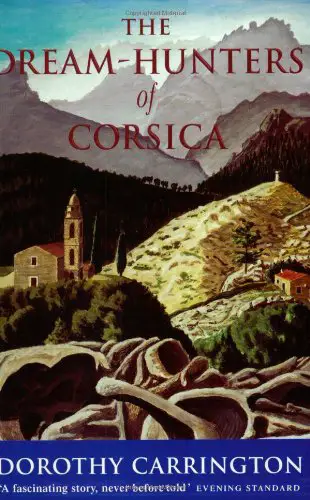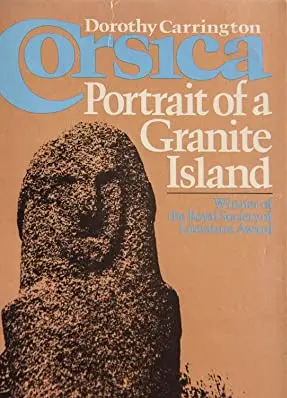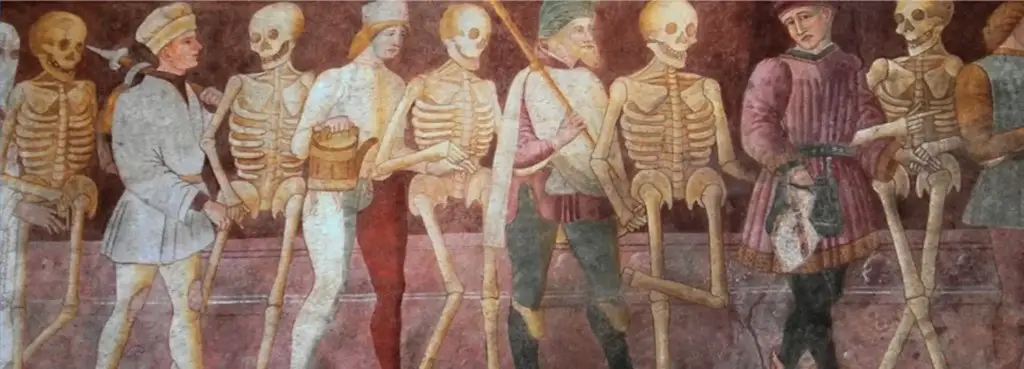A primitive universe, the Corsican one, splendidly described by Carrington in her “Granite Island”. A suspended, rarefied, immobile world, where Christianity has penetrated only superficially and has not affected the profound essence of an atavistic religiosity with shamanic traits, centered on the cult of the Ancestors, on the magical practices of the ecstatic brotherhoods, the Mazzèri, and on a folklore crystallized over the centuries, which speaks to us of the spirits of the dead and of a ghost procession of the "wild hunt" type led by a mysterious "white lady".
di Paul Mathlouthi
Places change according to the path you take to reach them. The means by which you travel is important, the company is important, the intermediate stages, the passages, the starting points and the landing places are very important. The only way to familiarize yourself with the Corsica, to get in tune with his genius loci, is to reach it by sea. Planted in the center of the Mediterranean, in a magical circle of peoples, languages and cultures, one step away from Liguria and Tuscany, a stone's throw from Provence and the Balearics, it is exotic yet familiar land. It is not a question of measuring distances from one coast to another, but of capturing the reflections that one and the other exchange, as if they were mirrors, sharing the same light and the same colors. If in this foolish age, subjugated by the demon of speed, time were not a tyrant, we should approach its shores slowly, like Ulysses towards Ithaca, fall in love with this austere island little by little and then, after a short stop, continue to turn of Andalusia, attracted by the spicy Moorish scents that never took root in these wind-swept stony ground, leaving only fleeting traces.
Someone wrote that Corsica has nothing romantic and that if the Grimm brothers had passed through these parts they would have pulled straight, greeted by the grim indifference of the natives. Lord Byron would not have agreed. He who of Romanticism was a sort of living icon, averse to conventions, contemptuous, tormented, libertine and libertarian, in 1825 published the account, imaginative yet realistic, of a trip to Corsica which in reality he never really made, demonstrating how much the granite island is, in the poets' imagination, the very embodiment of the Elsewhere. He echoes it, a short time later, Alexandre Dumas, which in an archaic and mysterious Corsica, populated by bandits and shaken by the succession of bloody family feuds, sets a murky story of love and death in gloomy hues that sees two brothers, Louis and Lucie, enmeshed in a toned ordeal Shakespeare which does not provide for safe conduct. In these pages we find the same atmospheres that, in the last century, have bewitched Dorothy Carrington (1910 - 2002), whose journey across the island was a long initiatory journey to discover magic and the arcane.

The literature of the twentieth century feeds on contamination, loves short circuits, bumpy paths, daring and unsettling syntheses. It was therefore no reason for particular surprise to discover that the most attentive scholar of Corsican culture, a refined interpreter of her indomitable, archaic and mysterious soul, revealed to the world in pages of rare intensity, was an English aristocrat. Daughter of that Frederick Carrington who, suffocating in blood the revolt of the Matabele, made a decisive contribution to the creation of the British colony of the Rhodhesia, Lady Frederica Dorothy Violet Rose was born in Gloucester on 6 June 1910. She was soon orphaned of both parents, she grows up in an austere women's boarding school. She immediately showed a disposition not very inclined to the discipline and a marked propensity to study the humanities which - which was quite rare for a woman at that time - allowed her to enter, seventh out of three hundred candidates, the prestigious University of Oxford.
Cultured, brilliant and nonconformist, however, wilting among the benches was not her greatest aspiration and in 1931 she gave up presenting the doctoral thesis on the XNUMXth century English novel on which she was working to marry Franz Resseguier Waldschutz, a Hungarian nobleman, owner of exterminated tobacco plantations in Africa, with which he moved to the continent. The two lead a carefree existence for a few years dividing between Paris and Vienna but, thanks to the numerous infidelities of both, the passion soon turns into ferocious resentment and in 1937, after obtaining a divorce, the reckless noblewoman returns to England. TO London meets Francis Rose, an affirmed painter friend of Salvador Dalì, who falls madly in love with her and encourages her to cultivate her literary vocation, giving to prints, in the immediate post-war period, The Traveller's Eye, a fictionalized essay on the great English explorers of the colonial epic now nearing sunset that marks her debut as a writer.
They will be the primeval landscapes of Corsica, however, to provide the starting point for the travel prose that will give her undying fame. At the invitation of a friend Jean Cesari, a Corsican, former Gaullist partisan known during the conflict who urged her to visit her at his ancestral home, Dorothy lands in Ajaccio for the first time, with her new wife in tow, in the summer of 1948.
“Corsica appeared to me at sunrise. His silouette colorless, with uncertain outlines, it seemed to float in the morning mist, the immaterial ectoplasm of a sea in a state of trance. This first vision allowed me to understand the feelings of Captain Cook as he discovered some wonderful island, lost in the Pacific. The mountains rose skyward in chains that followed one another, culminating in irregular rows of peaks, peaks and square protuberances that looked like giant teeth. Their sides, entirely covered by vegetation, seemed uninhabited and inaccessible. What would I find there besides rocks and forests? As we approached the coast, our attention was attracted to new details: few man-made works, scattered houses and cultivated fields, roads even rarer. Only a lighthouse and a watchtower rose from the Sanguinaires, a string of deserted islets jutting out from the bay like the bastions of an outpost. It was then that the first scent of the bush reached our nostrils, brought by a light breeze from the hinterland. It is the scent of Corsica as a whole, a bitter sweet essence, which recalls incense, intoxicating after the rain, like a drug. The scrub is an inextricable jungle of aromatic plants and shrubs: strawberry trees, myrtles, rock roses, mastic trees, rosemary, lavender and thyme. It covers almost the entire landscape, with the exception of forests and vegetable gardens. It has never been of much use, except as a refuge for the bandits and patriots who during the turbulent history of Corsica opposed the oppressors of the moment. But it represents a powerful and continuous enchantment. She falls asleep and wakes up with an unrivaled perfume. In the last days of his life, during his exile in Sant'Elena, Napoleon remembered him with nostalgia: his wounded pride found solace not in the memory of the palaces and triumphs, but in the fragrances of the wood of his childhood. " [1]

The one outlined in these lines is a real declaration of love for the granite island, who welcomes Dorothy in his rough arms and will never leave her again, becoming the chosen homeland of the young writer. "In Corsica she - she will say many years later - I think I have found the taste of absolute that I was looking for since I was a child". The early days of her new life are not easy at all. The husband, in need of a social recognition very different from what the austere island existence could offer him with his own constraints, soon left for other shores. As her family fortune, squandered by a gambling uncle and wasting females, evaporates in the blink of an eye, she finds herself having to fend for herself.
In 1953 he took up residence in a tiny apartment in the heart of Ajaccio made available by a friend and makes ends meet by reinventing himself as a tourist guide for the (few) foreign visitors. An occupation that certainly does not allow her the comforts of the past, forcing her to make poverty a question of style, as she herself admits, laughing, during a famous television interview, but allows her to live free and explore Corsica on foot far and wide. Short hair, corsair pants, amphibians and backpack on her shoulder, Dorothy retains, in her posture and facial features, the cheeky and cheeky charm of the uninhibited aristocrat who posed naked in Fernand Léger's studio in the Thirties but, at ease everywhere , as befits an English Lady, climbs like an ibex for sheep tracks and mule tracks, sleeps in sheepfolds, interacts with sailors from the dark past and philosopher fishermen who discuss with her about the best systems, talks with women who read the future in basins filled with oil. The vision of the majestic anthropomorphic megaliths of Filitosa, in the south of the island, marks the point of no return for the writer.
“Those gigantic warriors chiseled in stone long before the coming of the Greeks and Romans - he tells - they struck my imagination in a profound way, with the same excruciating intensity of the lost and suddenly found dear objects. "

He realizes that Corsica is a treasure chest and, behind the sparse Napoleonic vestiges, hides a secret garden full of timeless wonders, accessible only to those who know how to look in the right direction and have an ear trained to listen to the hiss of the wind in the branches. , the thousand voices of the forest and the desperate cry of the stormy sea. Discovers a pastoral society faithful to the land and the law of blood, detached from the senseless whirlwind of modernity, consumed by unquenchable rancor and fatal passions, angrily anchored to an ancestral sense of honor that does not disdain the use of revenge as a means of resolving disputes. Dorothy enters this lost Paradise without looking back.
"I began myself to the sound of archaic and delusional music, I began to discern the contours of beliefs that date back to the dawn of time."
A primitive universe, the Corsican one, a suspended, rarefied, immobile world, where Christianity has penetrated only superficially and has not affected the profound essence of an atavistic religiosity with shamanic traits, centered on the cult of the Ancestors. Carrington writes again:
"The Corsicans believe they are surrounded by a multitude of intangible beings: ghosts of the dead or anonymous, unknown spirits floating on the edge of consciousness and they appear preferably at night, between midnight and the first crowing of the rooster. Spirits of the dead come to reclaim the souls of the living and seeing them is considered a harbinger of doom. Many of those I have met swear they have had frightening encounters and this fear, although rarely manifested, never leaves them. In Corsica, repressed fears tend to resurface and take over. The spirit of the Enlightenment on which we rely so much risks abandoning us, leaving us at the mercy of the irrational. "

To guide her in this unexpected descent into Hades is always Jean Cesari, her mentor, who one evening, during a gargantuan dinner set for her at her uncles' farm, is the first to tell her strange stories about one White lady who, at the head of a pack of ferocious dogs and accompanied by other terrifying beings, suddenly appears to the inexperienced wayfarers who ventured into the bush at night, demanding their life or that of their relatives as a pledge. This infernal procession, known as "Arozza team", at certain times of the year it invades the streets of the villages, besieges the houses calling out the names of the designated victims who, alone to hear the feral call, will soon be dragged into the shadows. Dorothy is deeply impressed by such stories:
“As I listened to my diners tracing the lines of this imaginary map of cursed places in the region, telling of murderers and violent deaths, I began to get a different idea of the surrounding landscape. The silent air was full of voices for those who could understand them, the desolate spaces of the bush populated with the dead, for those who knew how to see them. Visions could reveal themselves, if one had the patience to wait in a place where a crime had been perpetrated, as if the boundary between the visible and the supernatural world had been definitively violated. Close to each other in the kitchen lit by the oil lamp that illuminated our absorbed faces, we were always aware of the night that surrounded us, oppressed us, penetrated through the windows through the incessant song of crickets and the croaking of frogs, so much so that the shadow mountains seemed to threaten the very walls of the house. Nothing could escape the secret restlessness aroused in us by this nocturnal world."
With the flick of the wing of the racial narrator Dorothy relates these accounts without altering the character of orality that distinguishes them and treading the accent on theirs fairytale lapel. Amused, she dwells on the consummate storytelling skills of her friend Jean who, like a medieval minstrel, keeps the attention of those present walking around the room and modulating the voice in a different way to give life to the various characters, while the dim light projects on the wall gloomy long shadows, in an atmosphere with a decidedly gothic flavor, for which the writer seems to have, at least judging by the rhythm of the narration, more than a debt of gratitude towards the great masters of the genre, her compatriots, such as Algernon Blackwood and John William Wall. In summoning the spirits, however, he inadvertently opens Pandora's box, exposing the reader to the sinister charm of a myth, that of Wild Hunt, of which the gang of Arozza is probably none other than one revisiting in the course area.
Carlos Ginzburg, who has dedicated a recently re-published famous essay to the subject, observes that if in the legends of the Scandinavian world the procession of the damned souls is generally led by a male figure behind whom it is possible to recognize a disguise of the god Odin, in central Europe the frenzied crowd that roams the streets at night reaping souls is often led by a woman, in all similar to the lady in white Carrington reports. In the minutes of the numerous trials for witchcraft celebrated from one end of the Old Continent to the other between the fourteenth and seventeenth centuries, the accused claim to have reached, covering great distances on the saddle of wild animals, inaccessible locations and to have participated, in one state of profound alteration of consciousness, al "Game" of Diana or Herodiana, a sort of bacchanal with strong orgiastic connotations which, canonized in medieval legal manuals, has been enriched with details over time and has come down to us as a stereotyped and literary representation of the Sabbath.
According to the famous anthropologist, behind the Greek goddess of hunting it is possible to recognize a reworking, mediated by the classical cultural model, of a pre-Roman divinity linked to fertility cults, such as the Germanic hold. Lady of the animals, she exercises control over the atmospheric elements, supervises the cyclical alternation of the seasons and, as the custodian of the secrets of life caught in its flow, can be giver of wealth and abundance but also a messenger of death, which explains its close link with the world of the dead. This last aspect, exasperated by inquisitorial propaganda, ended up relegating it to the sphere of the demonic, making it the ghostly presence that populates peasant fairy tales [2].

In Corsica the shadows spread at the edge of the day and the evanescent border that separates life from death is guarded by the so-called Mazzèri, “a kind of confraternity”Whose members, in all similar to Benandanti of the Friulian tradition, possess divinatory powers and the ability to perceive in sleep the soul of the people approaching to cross the threshold, which manifests itself to them with animal features [3]. Feared and respected by the locals, the "dream hunters" are not legendary figures but, as Dorothy can see in person, men and women in flesh and blood to whom, still in the sixties of the short century, the Corsicans they address with deference, as if they were oracles, jealous custodians and interpreters of a cult handed down through initiation.
“A black handkerchief framed her face, dropping almost to her eyebrows, and she squeezed a flap between her teeth, hiding the lower part of her face, like a frame for her arched nose and huge, mind-blowing eyes. I had met - writes Dorothy - the infamous gaze that pierces, typical of mazzèri. But it wasn't just creepy, it fascinated me. Her eyes, immense and sunken, were as blue as the sky: the eyes of a girl, ageless, vivid and bright, as if illuminated from within. They were not looking at me, but through me, intent on a personal vision. The woman was aware of their power. Her forehead was encircled by a white ribbon from which hung a gold earring. "It's to protect the eyes from evil" - she told me, touching it with her fingers - "I need my eyes." Those visionary eyes, which can perceive the condemned souls of the living in the dreamed animals, are the essential tool of the mazzèri. They know how to see beyond appearances. " [4].
Exactly as did Dorothy who, having arrived in Corsica attracted by side exotic of this brackish and burnt island, he was able to penetrate its innermost secrets, delivering his impressions to the pages of a diary with a powerful and evocative prose, a baedeker refined and cultured, with an airy, impeccably English style, which captivates like a novel but, in the wake of James Frazer, has the precision and exhaustive completeness of the cultural anthropology essay. Published in English in 1971, Granite Island. A portrait of Corsica the writer was awarded the prestigious Heinemann Prize of the Royal Literary Society. Translated into French in 1980 by Arthaud, the book immediately established itself as a classic of travel literature and opens the classrooms of the University of Court to Dorothy, which gives her a degree Honorary for his studies on the constitution launched by Pasquale Paoli.
To crown an existence consecrated to her adopted homeland, in 1995 Queen Elizabeth honors her with the Knight's Cross of the Order of the British Empire. Retired to a private life in a white house surrounded by mandarin trees clinging to a cliff overlooking the sea, where she has packed her many books and the old typewriter she has never given up on, she spends the last few years casting a lucid glance on the facts of the present. To those who ask her for an opinion on the separatist tremors that shake the island, she replies, enigmatic, that "In Corsica beauty and violence go hand in hand". An opinion that, given by her, has the flavor of the prophecy.

Note:
[1] As there is still an Italian language edition of Carrington's works, in order to obviate my lame knowledge of English, I used the French version of her Corsican diary for the citations reported in the text. The translation of the expunged passages is mine.
[2] C. Ginzburg, Night story. A decipherment of the Sabbath, Adelphi, Milan, 2017; pp. 73 –187.
[3] On the subject see C. Ginzburg, The Benandanti, Adelphi, Milan, 2020.
[4] Carrington has dedicated a specific essay to the fascinating theme of the mazzèri, "The dream hunters of Corsica", published in French for the types of the publisher Alain Piazzolla with the title Mazzeri, Fictions, Lords. Magical aspects - religeux de la culture corse.

A comment on "Dorothy Carrington's dream Corsica"